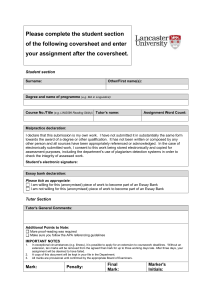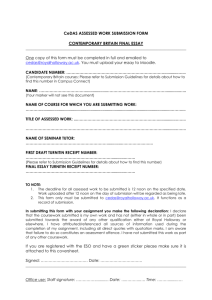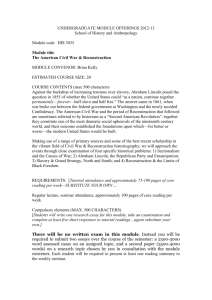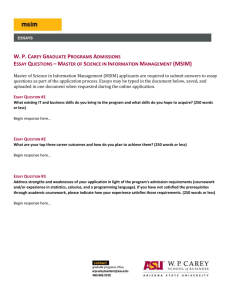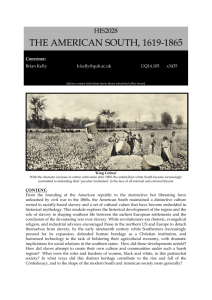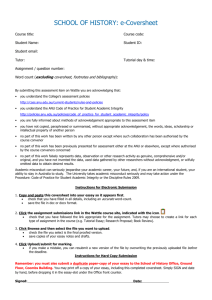AMERICA`S SECOND REVOLUTION:
advertisement
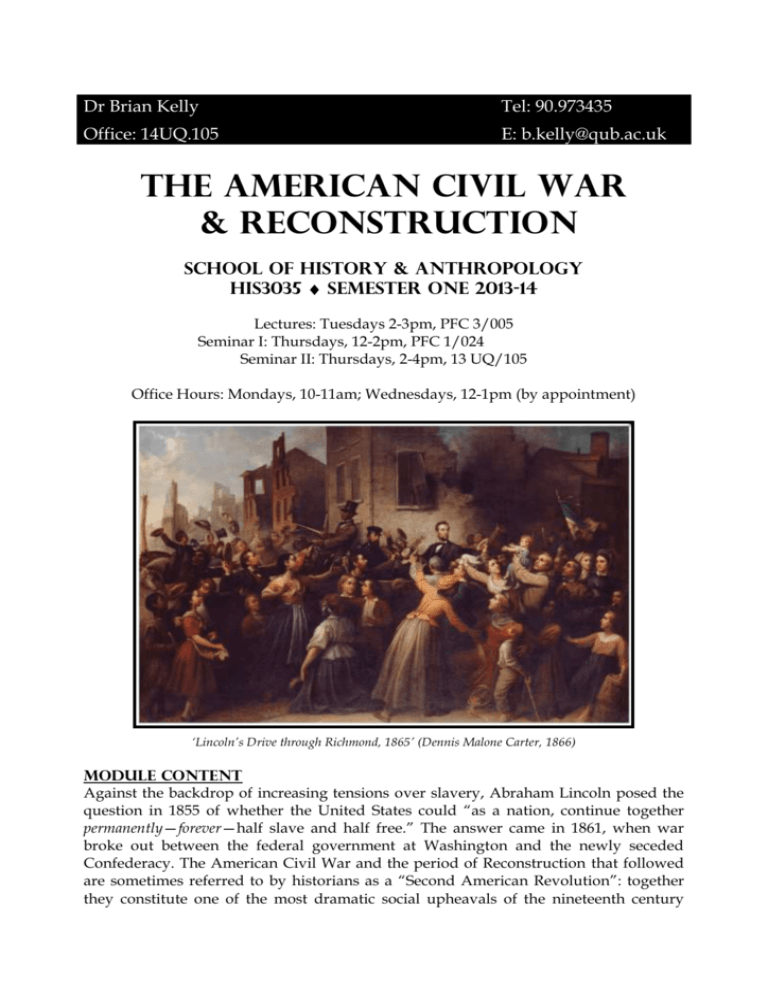
Dr Brian Kelly Tel: 90.973435 Office: 14UQ.105 E: b.kelly@qub.ac.uk THE AMERICAN CIVIL WAR & RECONSTRUCTION School of History & Anthropology HIS3035 Semester One 2013-14 Lectures: Tuesdays 2-3pm, PFC 3/005 Seminar I: Thursdays, 12-2pm, PFC 1/024 Seminar II: Thursdays, 2-4pm, 13 UQ/105 Office Hours: Mondays, 10-11am; Wednesdays, 12-1pm (by appointment) ‘Lincoln’s Drive through Richmond, 1865’ (Dennis Malone Carter, 1866) Module Content Against the backdrop of increasing tensions over slavery, Abraham Lincoln posed the question in 1855 of whether the United States could “as a nation, continue together permanently—forever—half slave and half free.” The answer came in 1861, when war broke out between the federal government at Washington and the newly seceded Confederacy. The American Civil War and the period of Reconstruction that followed are sometimes referred to by historians as a “Second American Revolution”: together they constitute one of the most dramatic social upheavals of the nineteenth century world, and their outcome established the foundations upon which—for better or worse—the modern United States would be built. Making use of a range of primary sources and some of the best recent scholarship in the vibrant field of Civil War & Reconstruction historiography, we will approach the events through close examination of key historical problems: sectionalism and the causes of war; Lincoln, war and emancipation; slavery and grand strategy, North and South; and Reconstruction & the limits of black freedom. Module Aims and Methods This module aims to provide you with a comprehensive understanding of one of the most critical periods in American history. Each week, we will make use of a selection of readings from the scholarly literature and original documents and artefacts from the historical record. In particular, we will be making extensive use of primary sources— from government and military documents to public speeches and newspaper editorials, political cartoons, diary entries and broadsides, private correspondence, sermons, courtroom and other oral testimony. But in order to make sense of these materials, it will be necessary that you devote a considerable effort to becoming familiar with the chronology of and major themes arising in the period under discussion, and that you develop a sense of how historians have agreed and disagreed in interpreting these issues. Much of your time will therefore be spent acquainting yourself with the substantial secondary literature in the field, including interpretive essays beyond the assigned texts. Seminars All of you know by now that a seminar can only work well when all of us come to class fully prepared to take part in discussion. That means, above all, having completed any assigned reading, but it should also mean that each of you sets some time aside before each weekly meeting—an hour or so—to gather your thoughts about the material we will be discussing. Some of you might be interested in booking a study room at the McClay Library to meet up outside of organized class meetings: if so let me know and I will liaise with library staff to arrange this. But regardless of how you choose to review you work each week, all of you should make it a point to sit down regularly before each weekly meeting: go over your notes on the readings; write down a list of questions for anything that is unclear to you; make it a point to raise any interesting problems or ambiguities in the material. And bring these thoughts and ideas to seminar with you. Intended Learning Outcomes Student performance inevitably varies. But by the end of the semester those of you who undertake the assigned coursework conscientiously should be able to: speak and write with fluency about the chronology of and major problems related to the American Civil War and Reconstruction; critically evaluate primary documents and understand their importance for reconstructing the past; evaluate the quality of a range of online resources and make use of them in an historical essay; 2 recognize and evaluate interpretive differences in historical writing on the subject; plan and implement an extended research project on a centrally related theme. Coursework There will be no written exam in this module. Instead you will be required to complete one online assignment and two written assignments. 1. Web Assignment (10%) In the first weeks of the semester, we will devote some of our seminar time to a discussion of how to make use of the internet for historical research. Coinciding with this, each student will complete an online assignment on ‘Evaluating Online Resources in History.” The assignment will be explained in Week Two and must be submitted electronically by Monday, 14 October (Week Three) by 12 noon. 2. Essay (30%) A 2500-3000 word essay on one of several suggested themes will be due on Monday, 18 November by 12 noon. The assignment will be explained in Week Three and must be submitted electronically. 3. Extended Research Project (50%) A second paper (4500-5000 words) on a research topic chosen by you in consultation with the module convener will be due on Monday 13 January by 12 noon, to be submitted electronically. Submitting your assessed work: Students must submit one electronic copy (via Queen's Online) of all written assessments. This must include an ‘Assessed Work Coversheet’ as the first page of your essay. The coversheets cannot be submitted separately. Procedure for Submitting Assessed Work: 1. Download the coversheet from the Course Submission Documents Section. 2. Complete all sections of the coversheet online. 3. Cut and paste the coversheet into the first page of your essay. 4. Submit your assessed work via QOL Assignment for your module. PLEASE NOTE: All assessed coursework is anonymously marked. Therefore students must ensure that neither their name nor their student number appears on any part of their essay, except for the coversheet. Coursework must be submitted electronically by 12.00 noon on the dates specified in the module handbooks for each course. Coursework submitted after 12:00 will be marked ‘LATE’. Assessment Your final mark will be based on four criteria: 3 Online Assignment Essay (2500-3000 words) Research Project (4500-5000 words) Seminar Participation 10% 30% 50% 10% 4
